Organizational Behavior Report: Shell PLC, Theories and Practices
VerifiedAdded on 2023/01/03
|13
|3298
|331
Report
AI Summary
This report provides an in-depth analysis of organizational behavior, focusing on various aspects within the context of Shell PLC. It begins by examining the influence of culture, power dynamics, and political influence on organizational behavior, utilizing Handy's cultural model and exploring different types of power such as legitimate, reward, and expert power. The report then delves into theories of motivation, including extrinsic and intrinsic motivation, and explores Maslow's Hierarchy of Needs and Expectancy Theory. Furthermore, it discusses the importance of cooperation and teamwork, highlighting different types of organizational teams and the impact of technology on team effectiveness. The report aims to provide a comprehensive understanding of the key elements that shape individual and group performance within an organization, offering valuable insights into how to enhance productivity and achieve organizational goals.
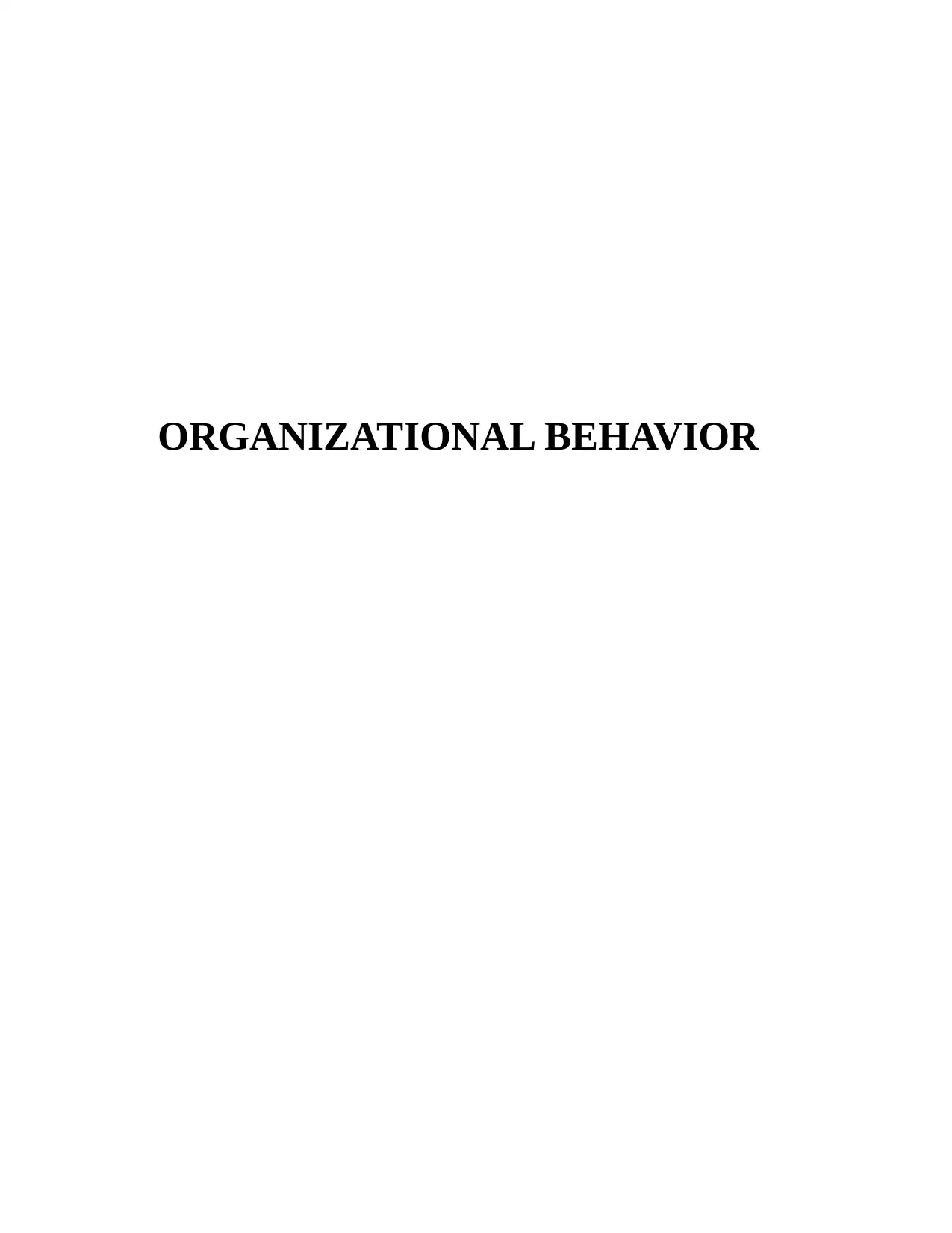
ORGANIZATIONAL BEHAVIOR
Paraphrase This Document
Need a fresh take? Get an instant paraphrase of this document with our AI Paraphraser
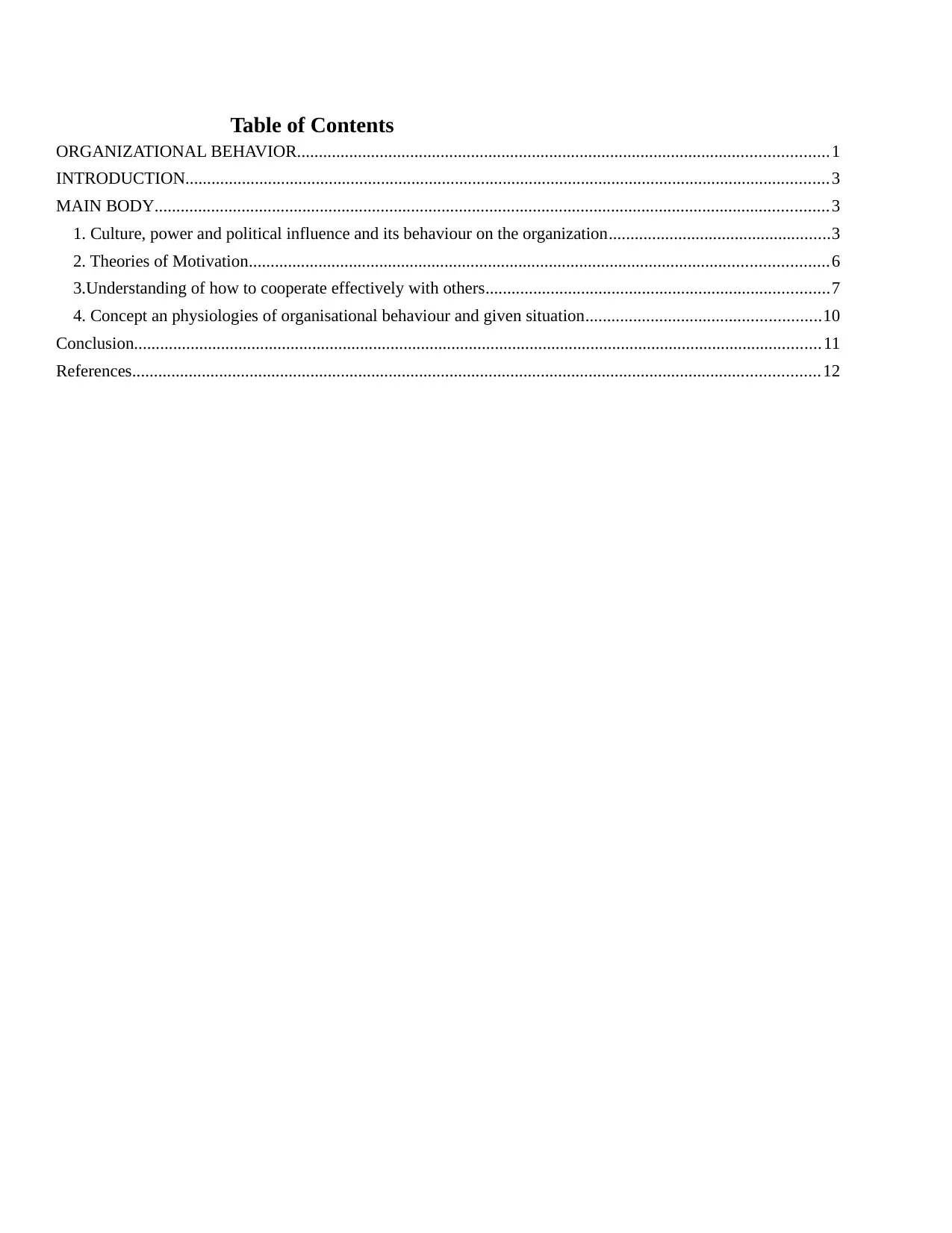
Table of Contents
ORGANIZATIONAL BEHAVIOR..........................................................................................................................1
INTRODUCTION....................................................................................................................................................3
MAIN BODY...........................................................................................................................................................3
1. Culture, power and political influence and its behaviour on the organization...................................................3
2. Theories of Motivation.....................................................................................................................................6
3.Understanding of how to cooperate effectively with others...............................................................................7
4. Concept an physiologies of organisational behaviour and given situation......................................................10
Conclusion..............................................................................................................................................................11
References..............................................................................................................................................................12
ORGANIZATIONAL BEHAVIOR..........................................................................................................................1
INTRODUCTION....................................................................................................................................................3
MAIN BODY...........................................................................................................................................................3
1. Culture, power and political influence and its behaviour on the organization...................................................3
2. Theories of Motivation.....................................................................................................................................6
3.Understanding of how to cooperate effectively with others...............................................................................7
4. Concept an physiologies of organisational behaviour and given situation......................................................10
Conclusion..............................................................................................................................................................11
References..............................................................................................................................................................12
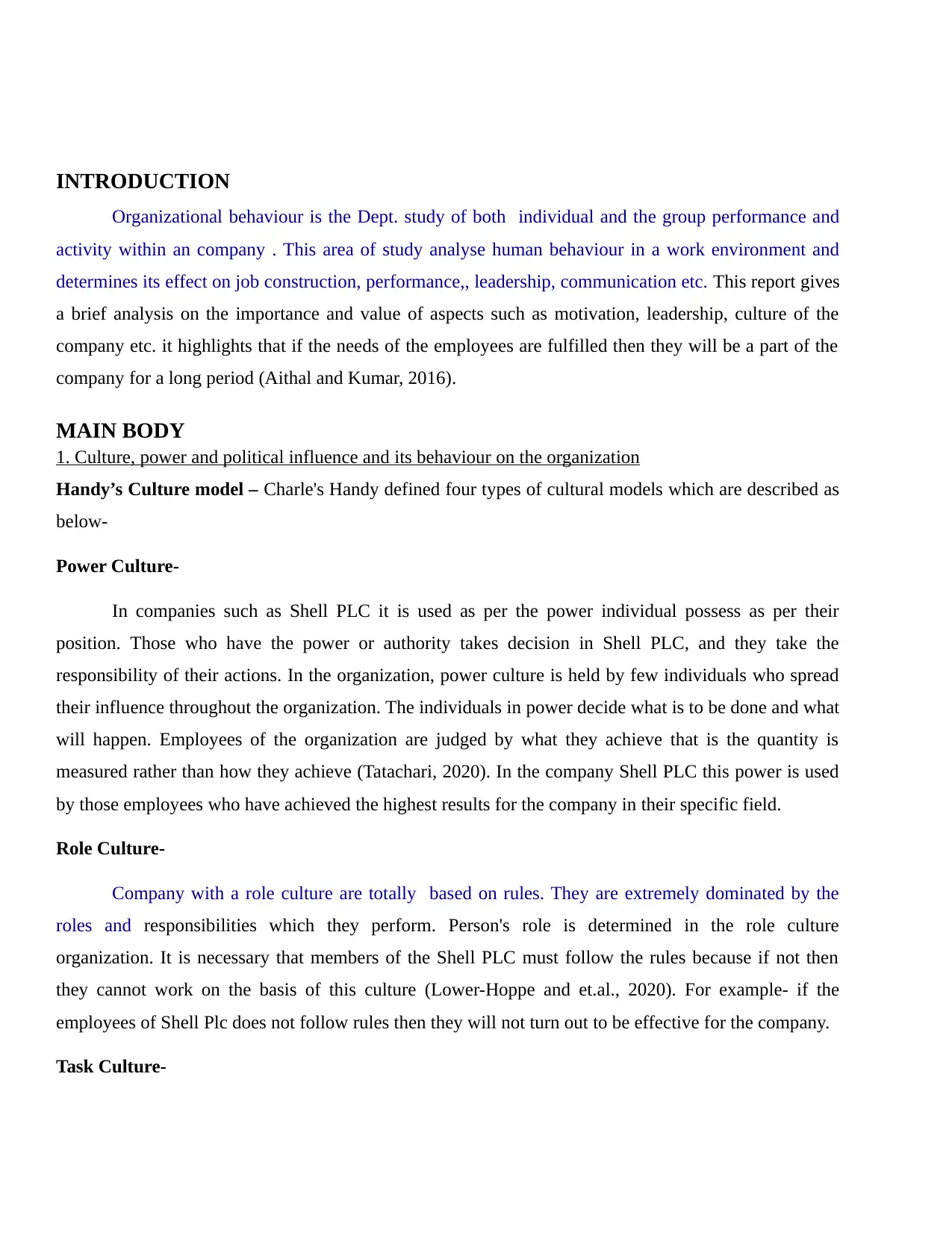
INTRODUCTION
Organizational behaviour is the Dept. study of both individual and the group performance and
activity within an company . This area of study analyse human behaviour in a work environment and
determines its effect on job construction, performance,, leadership, communication etc. This report gives
a brief analysis on the importance and value of aspects such as motivation, leadership, culture of the
company etc. it highlights that if the needs of the employees are fulfilled then they will be a part of the
company for a long period (Aithal and Kumar, 2016).
MAIN BODY
1. Culture, power and political influence and its behaviour on the organization
Handy’s Culture model – Charle's Handy defined four types of cultural models which are described as
below-
Power Culture-
In companies such as Shell PLC it is used as per the power individual possess as per their
position. Those who have the power or authority takes decision in Shell PLC, and they take the
responsibility of their actions. In the organization, power culture is held by few individuals who spread
their influence throughout the organization. The individuals in power decide what is to be done and what
will happen. Employees of the organization are judged by what they achieve that is the quantity is
measured rather than how they achieve (Tatachari, 2020). In the company Shell PLC this power is used
by those employees who have achieved the highest results for the company in their specific field.
Role Culture-
Company with a role culture are totally based on rules. They are extremely dominated by the
roles and responsibilities which they perform. Person's role is determined in the role culture
organization. It is necessary that members of the Shell PLC must follow the rules because if not then
they cannot work on the basis of this culture (Lower-Hoppe and et.al., 2020). For example- if the
employees of Shell Plc does not follow rules then they will not turn out to be effective for the company.
Task Culture-
Organizational behaviour is the Dept. study of both individual and the group performance and
activity within an company . This area of study analyse human behaviour in a work environment and
determines its effect on job construction, performance,, leadership, communication etc. This report gives
a brief analysis on the importance and value of aspects such as motivation, leadership, culture of the
company etc. it highlights that if the needs of the employees are fulfilled then they will be a part of the
company for a long period (Aithal and Kumar, 2016).
MAIN BODY
1. Culture, power and political influence and its behaviour on the organization
Handy’s Culture model – Charle's Handy defined four types of cultural models which are described as
below-
Power Culture-
In companies such as Shell PLC it is used as per the power individual possess as per their
position. Those who have the power or authority takes decision in Shell PLC, and they take the
responsibility of their actions. In the organization, power culture is held by few individuals who spread
their influence throughout the organization. The individuals in power decide what is to be done and what
will happen. Employees of the organization are judged by what they achieve that is the quantity is
measured rather than how they achieve (Tatachari, 2020). In the company Shell PLC this power is used
by those employees who have achieved the highest results for the company in their specific field.
Role Culture-
Company with a role culture are totally based on rules. They are extremely dominated by the
roles and responsibilities which they perform. Person's role is determined in the role culture
organization. It is necessary that members of the Shell PLC must follow the rules because if not then
they cannot work on the basis of this culture (Lower-Hoppe and et.al., 2020). For example- if the
employees of Shell Plc does not follow rules then they will not turn out to be effective for the company.
Task Culture-
⊘ This is a preview!⊘
Do you want full access?
Subscribe today to unlock all pages.

Trusted by 1+ million students worldwide
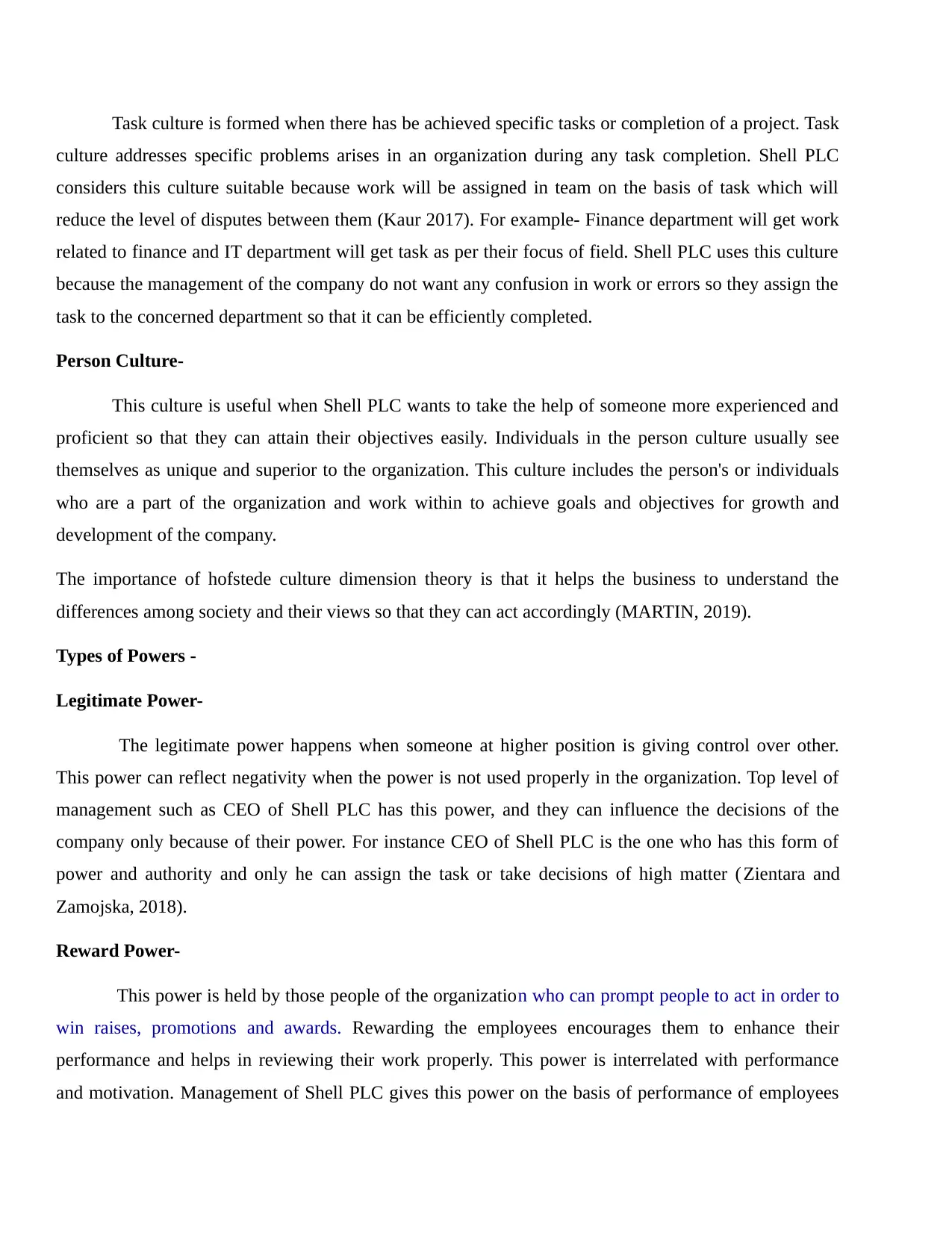
Task culture is formed when there has be achieved specific tasks or completion of a project. Task
culture addresses specific problems arises in an organization during any task completion. Shell PLC
considers this culture suitable because work will be assigned in team on the basis of task which will
reduce the level of disputes between them (Kaur 2017). For example- Finance department will get work
related to finance and IT department will get task as per their focus of field. Shell PLC uses this culture
because the management of the company do not want any confusion in work or errors so they assign the
task to the concerned department so that it can be efficiently completed.
Person Culture-
This culture is useful when Shell PLC wants to take the help of someone more experienced and
proficient so that they can attain their objectives easily. Individuals in the person culture usually see
themselves as unique and superior to the organization. This culture includes the person's or individuals
who are a part of the organization and work within to achieve goals and objectives for growth and
development of the company.
The importance of hofstede culture dimension theory is that it helps the business to understand the
differences among society and their views so that they can act accordingly (MARTIN, 2019).
Types of Powers -
Legitimate Power-
The legitimate power happens when someone at higher position is giving control over other.
This power can reflect negativity when the power is not used properly in the organization. Top level of
management such as CEO of Shell PLC has this power, and they can influence the decisions of the
company only because of their power. For instance CEO of Shell PLC is the one who has this form of
power and authority and only he can assign the task or take decisions of high matter ( Zientara and
Zamojska, 2018).
Reward Power-
This power is held by those people of the organization who can prompt people to act in order to
win raises, promotions and awards. Rewarding the employees encourages them to enhance their
performance and helps in reviewing their work properly. This power is interrelated with performance
and motivation. Management of Shell PLC gives this power on the basis of performance of employees
culture addresses specific problems arises in an organization during any task completion. Shell PLC
considers this culture suitable because work will be assigned in team on the basis of task which will
reduce the level of disputes between them (Kaur 2017). For example- Finance department will get work
related to finance and IT department will get task as per their focus of field. Shell PLC uses this culture
because the management of the company do not want any confusion in work or errors so they assign the
task to the concerned department so that it can be efficiently completed.
Person Culture-
This culture is useful when Shell PLC wants to take the help of someone more experienced and
proficient so that they can attain their objectives easily. Individuals in the person culture usually see
themselves as unique and superior to the organization. This culture includes the person's or individuals
who are a part of the organization and work within to achieve goals and objectives for growth and
development of the company.
The importance of hofstede culture dimension theory is that it helps the business to understand the
differences among society and their views so that they can act accordingly (MARTIN, 2019).
Types of Powers -
Legitimate Power-
The legitimate power happens when someone at higher position is giving control over other.
This power can reflect negativity when the power is not used properly in the organization. Top level of
management such as CEO of Shell PLC has this power, and they can influence the decisions of the
company only because of their power. For instance CEO of Shell PLC is the one who has this form of
power and authority and only he can assign the task or take decisions of high matter ( Zientara and
Zamojska, 2018).
Reward Power-
This power is held by those people of the organization who can prompt people to act in order to
win raises, promotions and awards. Rewarding the employees encourages them to enhance their
performance and helps in reviewing their work properly. This power is interrelated with performance
and motivation. Management of Shell PLC gives this power on the basis of performance of employees
Paraphrase This Document
Need a fresh take? Get an instant paraphrase of this document with our AI Paraphraser
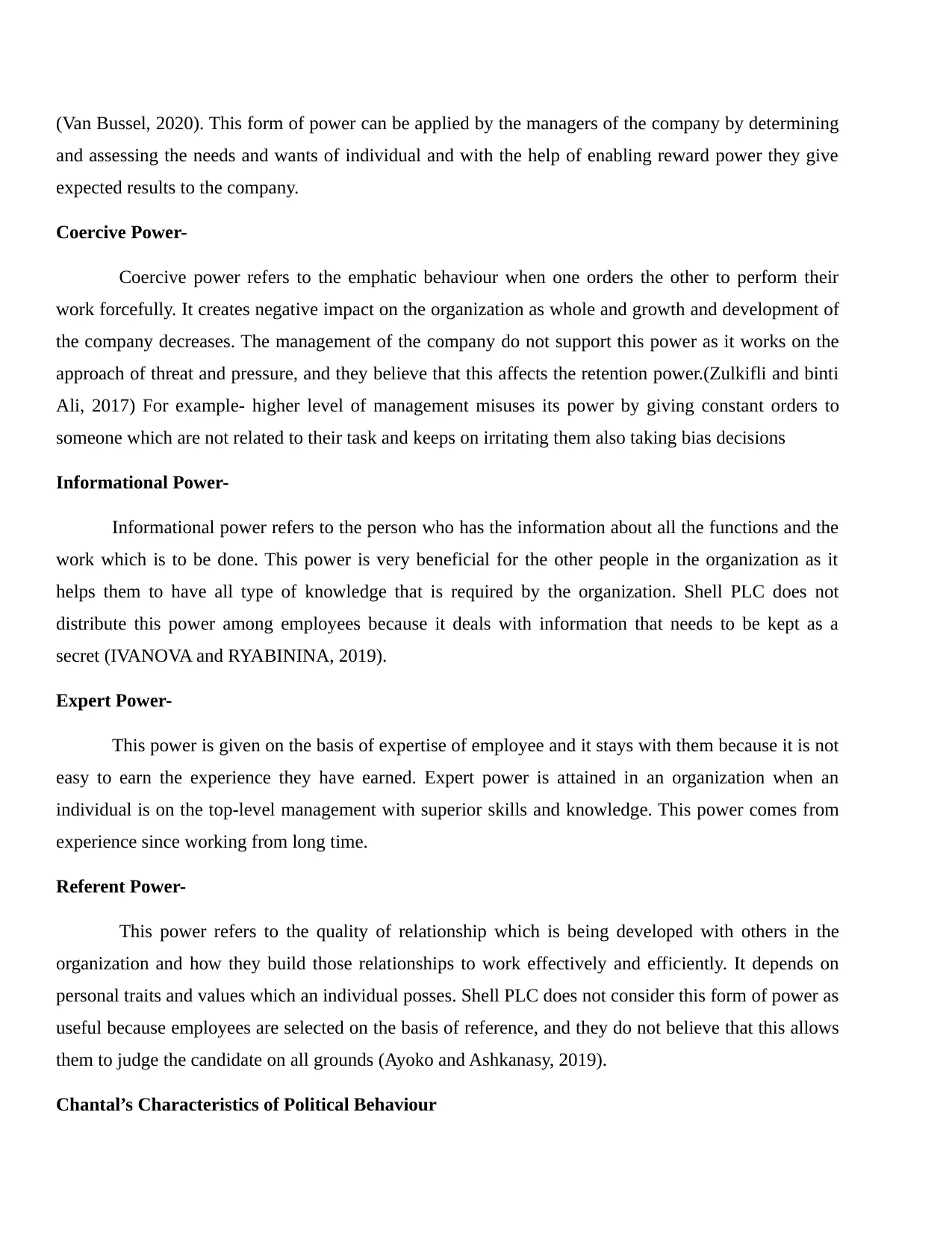
(Van Bussel, 2020). This form of power can be applied by the managers of the company by determining
and assessing the needs and wants of individual and with the help of enabling reward power they give
expected results to the company.
Coercive Power-
Coercive power refers to the emphatic behaviour when one orders the other to perform their
work forcefully. It creates negative impact on the organization as whole and growth and development of
the company decreases. The management of the company do not support this power as it works on the
approach of threat and pressure, and they believe that this affects the retention power.(Zulkifli and binti
Ali, 2017) For example- higher level of management misuses its power by giving constant orders to
someone which are not related to their task and keeps on irritating them also taking bias decisions
Informational Power-
Informational power refers to the person who has the information about all the functions and the
work which is to be done. This power is very beneficial for the other people in the organization as it
helps them to have all type of knowledge that is required by the organization. Shell PLC does not
distribute this power among employees because it deals with information that needs to be kept as a
secret (IVANOVA and RYABININA, 2019).
Expert Power-
This power is given on the basis of expertise of employee and it stays with them because it is not
easy to earn the experience they have earned. Expert power is attained in an organization when an
individual is on the top-level management with superior skills and knowledge. This power comes from
experience since working from long time.
Referent Power-
This power refers to the quality of relationship which is being developed with others in the
organization and how they build those relationships to work effectively and efficiently. It depends on
personal traits and values which an individual posses. Shell PLC does not consider this form of power as
useful because employees are selected on the basis of reference, and they do not believe that this allows
them to judge the candidate on all grounds (Ayoko and Ashkanasy, 2019).
Chantal’s Characteristics of Political Behaviour
and assessing the needs and wants of individual and with the help of enabling reward power they give
expected results to the company.
Coercive Power-
Coercive power refers to the emphatic behaviour when one orders the other to perform their
work forcefully. It creates negative impact on the organization as whole and growth and development of
the company decreases. The management of the company do not support this power as it works on the
approach of threat and pressure, and they believe that this affects the retention power.(Zulkifli and binti
Ali, 2017) For example- higher level of management misuses its power by giving constant orders to
someone which are not related to their task and keeps on irritating them also taking bias decisions
Informational Power-
Informational power refers to the person who has the information about all the functions and the
work which is to be done. This power is very beneficial for the other people in the organization as it
helps them to have all type of knowledge that is required by the organization. Shell PLC does not
distribute this power among employees because it deals with information that needs to be kept as a
secret (IVANOVA and RYABININA, 2019).
Expert Power-
This power is given on the basis of expertise of employee and it stays with them because it is not
easy to earn the experience they have earned. Expert power is attained in an organization when an
individual is on the top-level management with superior skills and knowledge. This power comes from
experience since working from long time.
Referent Power-
This power refers to the quality of relationship which is being developed with others in the
organization and how they build those relationships to work effectively and efficiently. It depends on
personal traits and values which an individual posses. Shell PLC does not consider this form of power as
useful because employees are selected on the basis of reference, and they do not believe that this allows
them to judge the candidate on all grounds (Ayoko and Ashkanasy, 2019).
Chantal’s Characteristics of Political Behaviour
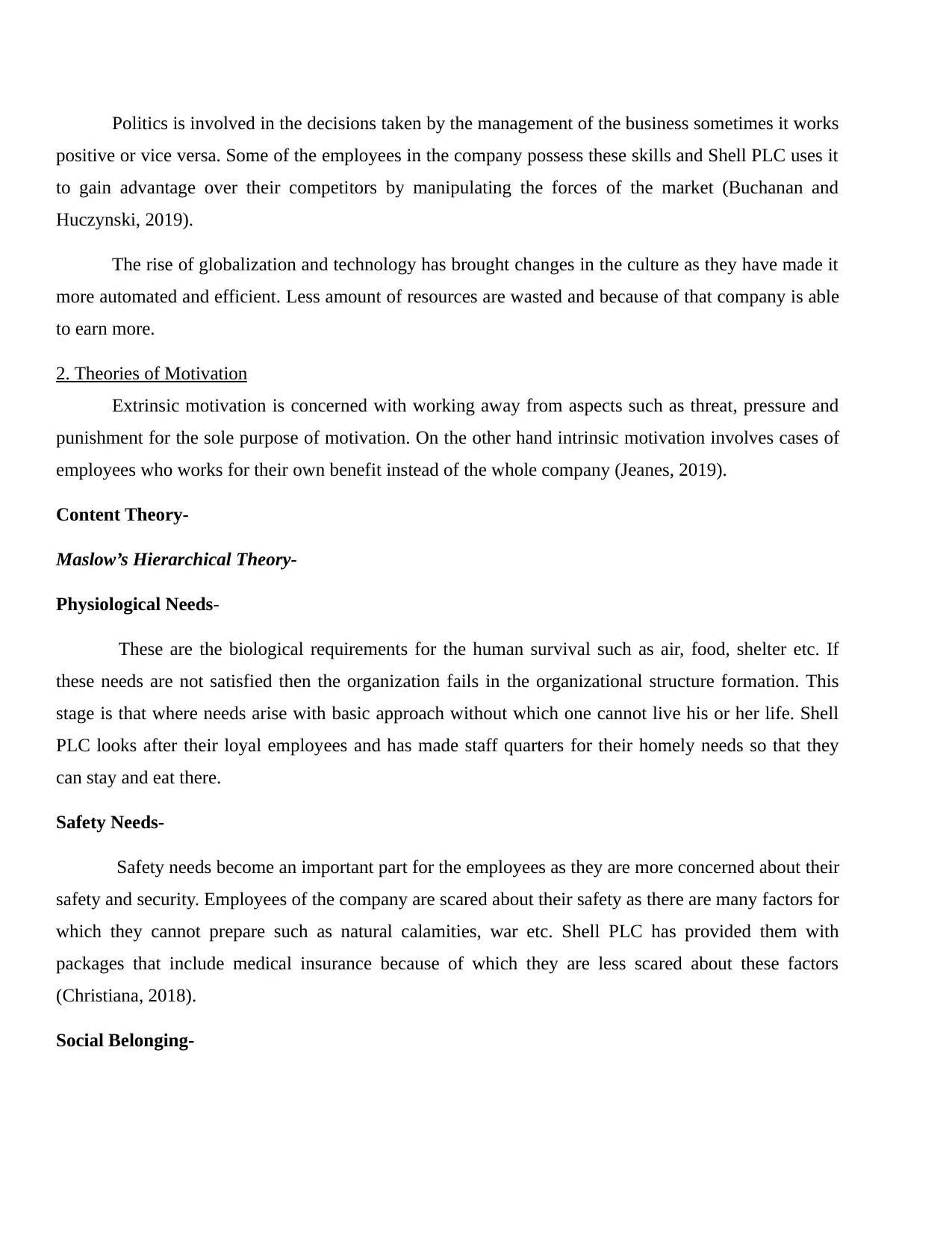
Politics is involved in the decisions taken by the management of the business sometimes it works
positive or vice versa. Some of the employees in the company possess these skills and Shell PLC uses it
to gain advantage over their competitors by manipulating the forces of the market (Buchanan and
Huczynski, 2019).
The rise of globalization and technology has brought changes in the culture as they have made it
more automated and efficient. Less amount of resources are wasted and because of that company is able
to earn more.
2. Theories of Motivation
Extrinsic motivation is concerned with working away from aspects such as threat, pressure and
punishment for the sole purpose of motivation. On the other hand intrinsic motivation involves cases of
employees who works for their own benefit instead of the whole company (Jeanes, 2019).
Content Theory-
Maslow’s Hierarchical Theory-
Physiological Needs-
These are the biological requirements for the human survival such as air, food, shelter etc. If
these needs are not satisfied then the organization fails in the organizational structure formation. This
stage is that where needs arise with basic approach without which one cannot live his or her life. Shell
PLC looks after their loyal employees and has made staff quarters for their homely needs so that they
can stay and eat there.
Safety Needs-
Safety needs become an important part for the employees as they are more concerned about their
safety and security. Employees of the company are scared about their safety as there are many factors for
which they cannot prepare such as natural calamities, war etc. Shell PLC has provided them with
packages that include medical insurance because of which they are less scared about these factors
(Christiana, 2018).
Social Belonging-
positive or vice versa. Some of the employees in the company possess these skills and Shell PLC uses it
to gain advantage over their competitors by manipulating the forces of the market (Buchanan and
Huczynski, 2019).
The rise of globalization and technology has brought changes in the culture as they have made it
more automated and efficient. Less amount of resources are wasted and because of that company is able
to earn more.
2. Theories of Motivation
Extrinsic motivation is concerned with working away from aspects such as threat, pressure and
punishment for the sole purpose of motivation. On the other hand intrinsic motivation involves cases of
employees who works for their own benefit instead of the whole company (Jeanes, 2019).
Content Theory-
Maslow’s Hierarchical Theory-
Physiological Needs-
These are the biological requirements for the human survival such as air, food, shelter etc. If
these needs are not satisfied then the organization fails in the organizational structure formation. This
stage is that where needs arise with basic approach without which one cannot live his or her life. Shell
PLC looks after their loyal employees and has made staff quarters for their homely needs so that they
can stay and eat there.
Safety Needs-
Safety needs become an important part for the employees as they are more concerned about their
safety and security. Employees of the company are scared about their safety as there are many factors for
which they cannot prepare such as natural calamities, war etc. Shell PLC has provided them with
packages that include medical insurance because of which they are less scared about these factors
(Christiana, 2018).
Social Belonging-
⊘ This is a preview!⊘
Do you want full access?
Subscribe today to unlock all pages.

Trusted by 1+ million students worldwide
1 out of 13
Related Documents
Your All-in-One AI-Powered Toolkit for Academic Success.
+13062052269
info@desklib.com
Available 24*7 on WhatsApp / Email
![[object Object]](/_next/static/media/star-bottom.7253800d.svg)
Unlock your academic potential
Copyright © 2020–2025 A2Z Services. All Rights Reserved. Developed and managed by ZUCOL.





